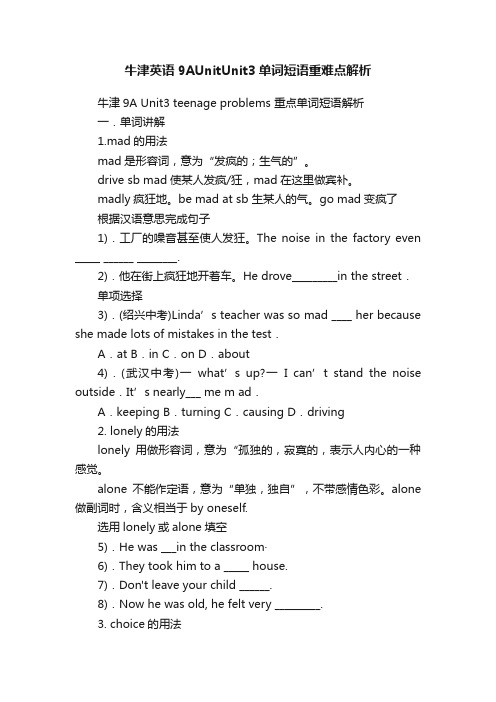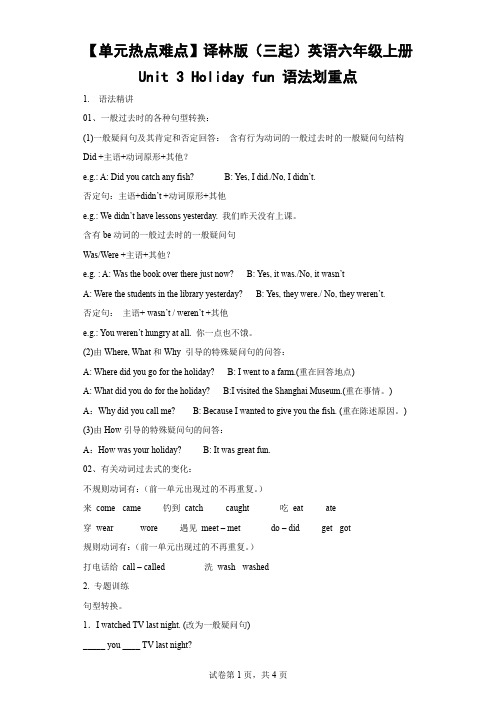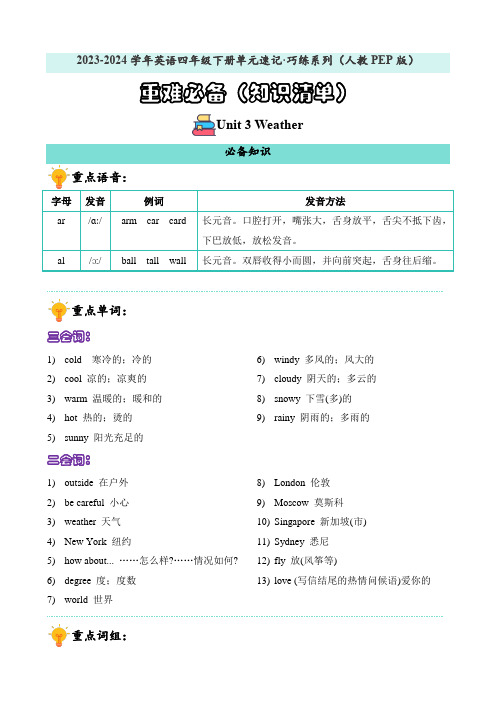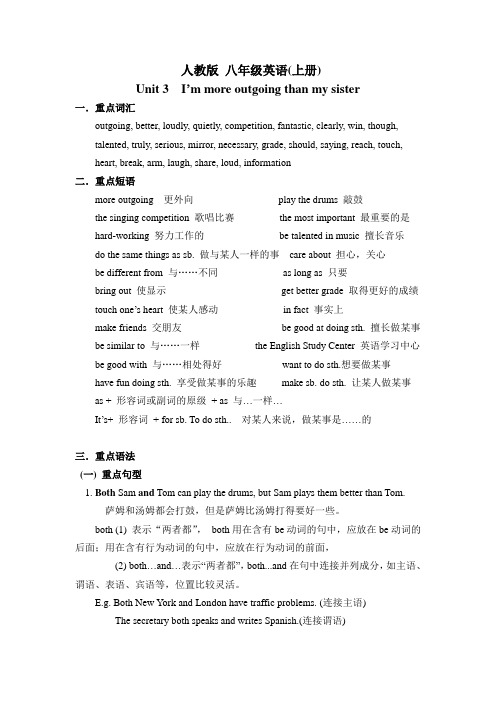Unit3 重难点解析
牛津英语9AUnitUnit3单词短语重难点解析

牛津英语9AUnitUnit3单词短语重难点解析牛津9A Unit3 teenage problems 重点单词短语解析一.单词讲解1.mad的用法mad是形容词,意为“发疯的;生气的”。
drive sb mad使某人发疯/狂,mad在这里做宾补。
madly疯狂地。
be mad at sb 生某人的气。
go mad变疯了根据汉语意思完成句子1).工厂的噪音甚至使人发狂。
The noise in the factory even _____ ______ ________.2).他在街上疯狂地开着车。
He drove_________in the street.单项选择3).(绍兴中考)Linda’s teacher was so mad ____ her because she made lots of mistakes in the test.A.at B.in C.on D.about4).(武汉中考)一what’s up?一I c an’t stand the noise outside.It’s nearly___ me m ad.A.keeping B.turning C.causing D.driving2. lonely的用法lonely用做形容词,意为“孤独的,寂寞的,表示人内心的一种感觉。
alone不能作定语,意为“单独,独自”,不带感情色彩。
alone 做副词时,含义相当于by oneself.选用lonely或alone填空5).He was ___in the classroom·6).They took him to a _____ house.7).Don't leave your child ______.8).Now he was old, he felt very _________.3. choice的用法choice是名词,意为“选择,挑选”,have no choice but to…意为“别无选择,只能……”。
【单元热点难点】译林版(三起)英语六年级上册Unit 3 Holiday fun 语法重点(含解析)

【单元热点难点】译林版(三起)英语六年级上册Unit 3 Holiday fun 语法划重点1. 语法精讲01、一般过去时的各种句型转换:(1)一般疑问句及其肯定和否定回答:含有行为动词的一般过去时的一般疑问句结构Did +主语+动词原形+其他?e.g.: A: Did you catch any fish? B: Yes, I did./No, I didn’t.否定句:主语+didn’t +动词原形+其他e.g.: We didn’t have lessons yesterday. 我们昨天没有上课。
含有be动词的一般过去时的一般疑问句Was/Were +主语+其他?e.g. : A: Was the book over there just now? B: Yes, it was./No, it wasn’tA: Were the students in the library yesterday? B: Yes, they were./ No, they weren’t.否定句:主语+ wasn’t / weren’t +其他e.g.: You weren’t hungry at all. 你一点也不饿。
(2)由Where, What和Why 引导的特殊疑问句的问答:A: Where did you go for the holiday? B: I went to a farm.(重在回答地点)A: What did you do for the holiday? B:I visited the Shanghai Museum.(重在事情。
)A:Why did you call me? B: Because I wanted to give you the fish. (重在陈述原因。
)(3)由How引导的特殊疑问句的问答:A:How was your holiday? B: It was great fun.02、有关动词过去式的变化:不规则动词有:(前一单元出现过的不再重复。
牛津英语9AUnitUnit3单词短语重难点解析

牛津9A Unit3 teenage problems 重点单词短语解析一.单词讲解1.mad的用法mad是形容词,意为“发疯的;生气的”。
drive sb mad使某人发疯/狂,mad在这里做宾补。
madly疯狂地。
be mad at sb 生某人的气。
go mad变疯了根据汉语意思完成句子1).工厂的噪音甚至使人发狂。
The noise in the factory even _____ ______ ________.2).他在街上疯狂地开着车。
He drove_________in the street.单项选择3).(绍兴中考)Linda’s teacher was so mad ____ her because she made lots of mistakes in the test.A.at B.in C.on D.about4).(武汉中考)一what’s up?一I can’t stand the noise outside.It’s nearly___ me mad.A.keeping B.turning C.causing D.driving2. lonely的用法lonely用做形容词,意为“孤独的,寂寞的,表示人内心的一种感觉。
alone不能作定语,意为“单独,独自”,不带感情色彩。
alone做副词时,含义相当于by oneself.选用lonely或alone填空5).He was ___in the classroom·6).They took him to a _____ house.7).Don't leave your child ______.8).Now he was old, he felt very _________.3. choice的用法choice是名词,意为“选择,挑选”,have no choice but to…意为“别无选择,只能……”。
Unit3重难必备(知识清单)-2023-2024学年英语四年级下册单元速记巧练系列(人教PEP版)

2023-2024学年英语四年级下册单元速记·巧练系列(人教PEP版)重难必备(知识清单)Unit 3 Weather必备知识重点语音:重点单词:三会词:1)cold 寒冷的;冷的2)cool 凉的;凉爽的3)warm 温暖的;暖和的4)hot 热的;烫的5)sunny 阳光充足的6)windy 多风的;风大的7)cloudy 阴天的;多云的8)snowy 下雪(多)的9)rainy 阴雨的;多雨的二会词:1)outside 在户外2)be careful 小心3)weather 天气4)New York 纽约5)how about... ……怎么样?……情况如何?6)degree 度;度数7)world 世界8)London 伦敦9)Moscow 莫斯科10)Singapore 新加坡(市)11)Sydney 悉尼12)fly 放(风筝等)13)love (写信结尾的热情问候语)爱你的重点词组:1)be careful 小心3)how about... ……怎么样?……情况如何?2)New York 纽约重点句型:1)Can I go outside now? 现在我能出去吗?2)It's cold outside. 外面冷。
3)Yes,you can./No,you can't. 可以。
/不行。
4)What's the weather like in New York? 纽约天气怎么样?5)It's rainy. 是下雨天。
6)Is it cold? 天冷吗?7)No,it isn't. 不,不冷。
8)It's 26 degrees. 是26度。
重难点解析重点词汇详解:①outside 在户外【词性】副词【近义词】outdoors在户外【巧记】out(外面)+side(方面;旁边)=outside(在户外)【拓展】outside作形容词时,意思为“外面的”。
人教版英语八年级上册《Unit-3-I'm-more-outgoing-than-my-sister》单元重难点

人教版八年级英语(上册)Unit 3 I’m more outgoing than my sister一.重点词汇outgoing, better, loudly, quietly, competition, fantastic, clearly, win, though,talented, truly, serious, mirror, necessary, grade, should, saying, reach, touch,heart, break, arm, laugh, share, loud, information二.重点短语more outgoing 更外向play the drums 敲鼓the singing competition 歌唱比赛the most important 最重要的是hard-working 努力工作的be talented in music 擅长音乐do the same things as sb. 做与某人一样的事care about 担心,关心be different from 与……不同as long as 只要bring out 使显示get better grade 取得更好的成绩touch one’s heart 使某人感动in fact 事实上make friends 交朋友be good at doing sth. 擅长做某事be similar to 与……一样the English Study Center 英语学习中心be good with 与……相处得好want to do sth.想要做某事have fun doing sth. 享受做某事的乐趣make sb. do sth. 让某人做某事as + 形容词或副词的原级+ as 与…一样…It’s+ 形容词+ for sb. To do sth.. 对某人来说,做某事是……的三.重点语法(一) 重点句型1. Both Sam and Tom can play the drums, but Sam plays them better than Tom.萨姆和汤姆都会打鼓,但是萨姆比汤姆打得要好一些。
Unit 3 重难知识点(复习讲义)五年级英语上册(译林版三起)

Unit 3 Our animal friends(含答案)重难点讲解(含答案)一、重难点讲解1.One is red and the other is black. 一个是红色的,另一个是黑色的。
解析:one ..., the other ...意为“一个…,另一个…”,用来描述特定的两个人或物,后接同类的单词或短语。
【例句】There are two apples in the basket. One is red and the other is green.篮子里有两个苹果。
一个是红色的,另一个是绿色的。
【练习】单项选择。
( )I have two storybooks. One is new and is old.A. anotherB. othersC. the other【答案】C2.They have no legs or arms, but they have big tails. 它们没有腿和手臂,但是它们有大尾巴。
解析:no用于名词前,表示否定意义。
●当no修饰的是可数名词单数时,“no+可数名词单数”相当于not a(n);●当no修饰的是可数名词复数或不可数名词时,“no+可数名词复数或不可数名词”则相当于not any。
●or用作连词“也不”解时,通常用于否定句中,在句子中连接两个并列成分。
【例句】(1) There is no juice in the glass.=There isn't any juice in the glass.玻璃杯里没有果汁。
(2) I have no brothers or sisters. 我没有兄弟姐妹。
【练习】按要求完成句子。
(1) They have no tails. They have no wings either.(合并为一句)They have tails wings.(2) Mike has no money with him.(改为同义句)Mike money with him.【答案】(1) no, or (2) doesn't have any3.It can run and jump. 它既会跑又会跳。
新目标英语八年级下 Unit3重难点解析
M 61.【原句】The girl was shopping whenthe alien g ot out.While the g irl was shopping,the alien go t out.【讲解】w hen 和while 都可以作连词,意为“当……的时候”。
when 引导的从句中动词多为短暂性动词,主句动词多为延续性动词,主从句一般不同时使用进行时态;w hile 前后两个动词可同为延续性动词,即可同时使用进行时态;当从句用延续性动词且为进行时时,二者可互换。
例如:When /While the alien went shopping a souv enir,the g irl called the police 。
【真题】①Bad luck :We M ount Emei w hen it rained heavily .(2005江苏省泰州市)A.climbedB.were climbingC.are climbing D .have climbed 【点拨】选B 。
由句意及从句的时态可判断出空白处应填入过去进行时。
本句中的w hen 意为at or during that time ,用来强调从句动作发生的突然性,这时,其主句往往用进行时。
答案为B 。
【真题】②Lo ok :The bo ys are foo tball w hile the g irls are .(2005湖南省岳阳市)A.play ing H danceB.playing H dancingC.play H dancingD.play H dance 【点拨】选B 。
由空格前的两个are 可判断出答案为B 。
本句中的w hile 可译为“与此同时”,用来表示两个动作同时进行。
2.【原句】What happened w hile Linda was on the telephone I【讲解】happen 是不及物动词,意为“发生”,没有被动语态,且主语不能为表示人的名词或代词。
新人教版英语八年级上册--unit 3 课文重难点讲解
2014八年级上Unit3 I’m more outgoing than my sister.重点单词:Outgoing necessary better both loudly shouldQuietly saying hard-working reach competitionHand fantastic touch which factClearly break win laugh thoughShare talented loud share trulyCare similar serious information重点短语which one in fact care about make sb. laughPrimary school be similar to as long as have funthe same as get better grades bring out share everything重点句型1.---Is Tom smarter than Sam?---No, he isn’t..2.----Are you as friendly as your sister?3. For me, a good friend likes to do the same things as me.4. I think a good friend makes me laugh.语法: 形容词和副词的比较级。
1. I’m more outgoing than my sister.outgoing 比较级----more outgoing.2. Loud, loudly, aloud. 作副词时:“大声地”,有时可互换。
Aloud重点在于“出声”(能被人吃见,但声音不一定很大). 常与read, think连用:The teacher always asks us to read aloud.Loud 多作形容词:He gave a loud laugh. Don’t speak so loud.Loudly 多跟表示“喧闹,抱怨”的动词连用,可置于动词前或后,与quietly相对:He complained loudly.3. win: 过去式和过去分词分别为:won, won. 现在分词为winning.Beat与winBeat为“打败,战胜”,后接比赛,战斗的对手,可以是人或者集体。
人教新目标英语七年级上册Starter Unit 3 What colour is it 单元重难点及考点归纳
Starter Unit3 单元重难点归纳一、重点词汇color 颜色yellow 黄色(的)green 绿色(的)red 红色(的)blue 蓝色(的)black 黑色(的)white 白色(的)purple 紫色(的)now 现在;目前see 理解;明白can 能;会say 说;讲my 我的brown 棕色(的);褐色(的)the 指已提到或已领会到的人或事物二、重点短语1. what color 什么颜色2. the key这把钥匙3. color the things 给物品涂颜色4. the ruler 这把尺子5. the cup 这个杯子6. in Dale 在Dale(戴尔)里三、常考句型1.—What’s this/ that? 这/ 那是什么?—It’s…它是……2.—What color is it?它是什么颜色的?—It’s…它是……3. can+动词原形:能/会……四、重点语法定冠词的用法1) 用以特指某(些)人或某(些)事物This is the house where Luxun once lived. 这是鲁迅曾经住过的房子。
2) 用于指谈话双方都明确所指的人或事物Open the door, please. 请把门打开。
3) 用以复述上文提过的人或事物(第一次提到用“a或an”,以后再次提到用“the”)Once there lived a lion in the forest. Every day the lion asked small animals to look for food for him. 从前森林里住着一只狮子。
每天这只狮子要小动物们为他寻找食物。
4) 用在序数词和形容词最高级前January is the first month of the year. 一月份是一年当中的第一个月。
Shanghai is the biggest city in China. 上海是中国最大的城市。
【单元热点难点】译林版(三起)英语五年级上册Unit3 语法划重点-(含解析)
【单元热点难点】译林版(三起)英语五年级上册Unit3 Our animal friends 语法划重点1. 语法精讲01. have / has 用法:have 可用于第三人称单数之外的所有人称之后,has 只能用于第三人称单数之后。
have / has 的肯定句结构为:(1)主语(除第三人称单数)+ have + 某物。
如:We have a big classroom.我们有一个大教室。
The boys have some interesting books. 男孩们有一些有趣的书。
(2)主语(第三人称单数)+ has+某物。
如:She has a good friend. 她有一个好朋友。
My brother has a nice car. 我哥哥有一辆好看的车。
have / has 的一般疑问句结构为:(1)Do+ 主语(除第三人称单数)+ have+ 某物?如:Do you have a big classroom? 你们有一个大的教室吗?Do the boys have any interesting books. 男孩们有一些有趣的书吗?(2)Does +主语(第三人称单数)+have +某物?Does she have a good friend? 她有一个好朋友吗?Does your brother have a nice car ?你哥哥有一辆好看的车吗?have / has 的否定句结构为:(1)主语(除第三人称单数)+ don’t+ have + 某物。
We don’t have a big classroom.我们没有一个大教室。
The boys don’t have any interesting books. 男孩们没有一些有趣的书。
(2)主语(第三人称单数)+ doesn’t+ have + 某物。
She doesn’t have a good friend. 她没有一个好朋友。
- 1、下载文档前请自行甄别文档内容的完整性,平台不提供额外的编辑、内容补充、找答案等附加服务。
- 2、"仅部分预览"的文档,不可在线预览部分如存在完整性等问题,可反馈申请退款(可完整预览的文档不适用该条件!)。
- 3、如文档侵犯您的权益,请联系客服反馈,我们会尽快为您处理(人工客服工作时间:9:00-18:30)。
Unit 3重难点解析
1. His charming character The Little Tramp is well known throughout the world. (Reading)
此句中throughout用作介词,它也可作副词,表示地点或时间,意为“遍及于……,到处;从头至尾,在整个……期间”。
如:
They searched throughout the town for the lost child.
他们在镇上到处寻找那走失的孩子。
The house was painted green throughout. 那房子全部漆成了绿色。
They worked like that throughout the year. 他们整年都那样工作。
The girl remained silent throughout. 那女孩始终保持沉默。
2. He played a poor and homeless person, who wore large trousers, worn-out shoes and a small round black hat and carried a walking stick.(Reading)
walking 是-ing形式作定语修饰stick,此处用来说明stick的用途或作用,可变成定语从句a stick which / that is used for walking。
如:
There is a beautiful swimming pool in our school. (= a pool which / that is used for swimming)
我们学校里有一个美丽的游泳池。
Have you bought a ticket for the sleeping car? (= a car which / that is used for sleeping;car在此作“火车车厢”解)
你买到卧铺票了吗?
-ing形式作定语时,还可用来说明它所修饰的名词“正在干……”或说明名词的性质与特征。
如:
The teacher criticized the sleeping boy in class. (= the boy who was sleeping)
老师批评了上课睡觉的男孩。
I have seen the interesting film three times.
这部有趣的电影我已看过三次了。
3. This character was a social failure but he was loved by all who watched the films for his determination in overcoming difficulties and being kind even when people were unkind to him.
(Reading)
difficulty 在此句中是可数名词,意为“困难的事,难题等”。
如:
She met with many difficulties when she was traveling in Africa.
她在非洲旅游时,遇到了很多困难。
All kinds of difficulties have to be overcome. 所有难题都必须克服。
difficulty 还可作不可数名词,常用于下列结构:have difficulty (in) doing sth. / with sth.;There is difficulty in doing sth. 等,意为“干……有困难”。
如:
I have difficulty in solving the maths problem / with the maths problem.
我解这个数学题有困难。
There is some difficulty in understanding the passage.
这篇文章不好理解。
4. The film is set in California in the middle of the nineteenth century when gold was discovered and thousands of people rushed there in search of it. (Reading) be set in意为“以……为背景”。
如:
The novel is set in Paris in the 18th century.
那本小说以十八世纪的巴黎为背景。
The book is set in 17th century Spain.
这本书以十七世纪的西班牙为背景。
